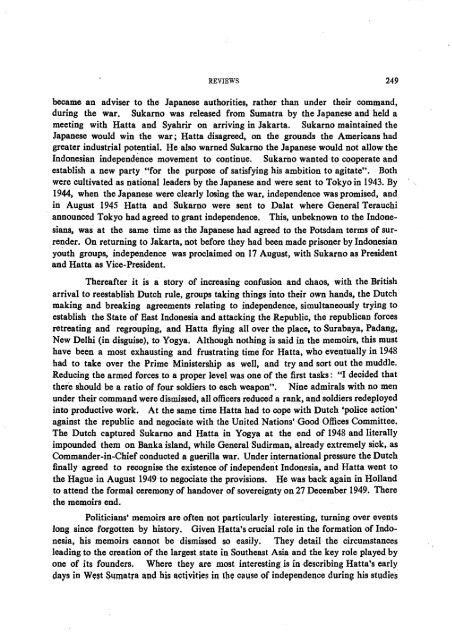The Journal of the Siam Society Vol. LXXI, Part 1-2, 1983 - Khamkoo
The Journal of the Siam Society Vol. LXXI, Part 1-2, 1983 - Khamkoo
The Journal of the Siam Society Vol. LXXI, Part 1-2, 1983 - Khamkoo
You also want an ePaper? Increase the reach of your titles
YUMPU automatically turns print PDFs into web optimized ePapers that Google loves.
REVIEWS 249<br />
became an adviser to <strong>the</strong> Japanese authorities, ra<strong>the</strong>r than under <strong>the</strong>ir command,<br />
during <strong>the</strong> war. Sukamo was released from Sumatra by <strong>the</strong> Japanese and held a<br />
meeting with Hatta and Syahrir on arriving in Jakarta. Sukarno maintained <strong>the</strong><br />
Japanese would win <strong>the</strong> war; Hatta disagreed, on <strong>the</strong> grounds <strong>the</strong> Americans had<br />
greater industrial potential. He also warned Sukarno <strong>the</strong> Japanese would not allow <strong>the</strong><br />
Indonesian independence movement to continue. Sukarno wanted to cooperate and<br />
establish a new party "for <strong>the</strong> purpose <strong>of</strong> satisfying his ambition to agitate". Both<br />
were cultivated as national leaders by <strong>the</strong> Japanese and were sent to Tokyo in 1943. By<br />
1944, when <strong>the</strong> Japanese were clearly losing <strong>the</strong> war, independence was promised, and<br />
in August 1945 Hatta and Sukarno were sent to Dalat where General Terauchi<br />
announced Tokyo had agreed to grant independence. This, unbeknown to <strong>the</strong> Indonesians.,<br />
was at <strong>the</strong> same time as <strong>the</strong> Japanese had agreed to <strong>the</strong> Potsdam terms <strong>of</strong> surrender.<br />
On returning to Jakarta, not before <strong>the</strong>y had been made prisoner by Indonesian<br />
youth groups, independence was proclaimed on 17 August, with Sukarno as President<br />
and Hatta as Vice-President.<br />
<strong>The</strong>reafter it is a story <strong>of</strong> increasing confusion and chaos, with <strong>the</strong> British<br />
arrival to reestablish Dutch rule, groups taking things into <strong>the</strong>ir own hands, <strong>the</strong> Dutch<br />
making and breaking agreements .relating to independence, simultaneously trying to<br />
establish <strong>the</strong> State <strong>of</strong> East Indonesia and attacking <strong>the</strong> Republic, <strong>the</strong> republican forces<br />
retreating and regrouping, and Hatta flying all over <strong>the</strong> place, to Surabaya, Padang,<br />
New Delhi (in disguise), to Yogya. Although nothing is said in <strong>the</strong> memoirs, this must<br />
have been a most exhausting and frustrating time for Hatta, who eventually in 1948<br />
had to take over <strong>the</strong> Prime Ministership as well, and try and sort out <strong>the</strong> muddle.<br />
Reducing <strong>the</strong> armed forces to a proper level was one <strong>of</strong> <strong>the</strong> first tasks : "I decided that<br />
<strong>the</strong>re should be a ratio <strong>of</strong> four soldiers to each weapon". Nine admirals with no men<br />
under <strong>the</strong>ir command were dismissed, all <strong>of</strong>ficers reduced a rank, and soldiers redeployed<br />
into productive work. At <strong>the</strong> same time Hatta had to cope with Dutch 'police action'<br />
against <strong>the</strong> republic and negociate with <strong>the</strong> United Nations' Good Offices Committee.<br />
<strong>The</strong> Dutch captured Sukamo and Hatta in Yogya at <strong>the</strong> end <strong>of</strong> 1948 and literally<br />
impounded <strong>the</strong>m on Banka island, while General Sudirman, already extremely sick, as<br />
Commander-in-Chief conducted a guerilla war. Under international pressure <strong>the</strong> Dutch<br />
finally agreed to recognise <strong>the</strong> existence <strong>of</strong> independent Indonesia, and Hatta went to<br />
<strong>the</strong> Hague in August 1949 to negociate <strong>the</strong> provisions. He was back again in Holland<br />
to attend <strong>the</strong> formal ceremony <strong>of</strong> handover <strong>of</strong> sovereignty on 27 December 1949. <strong>The</strong>re<br />
<strong>the</strong> memoirs end.<br />
Politicians' memoirs are <strong>of</strong>ten not particularly interesting, turning over events<br />
long since forgotten by history. Given Hatta's crucial role in <strong>the</strong> formation <strong>of</strong> Indonesia,<br />
his memoirs cannot be dismissed so easily. <strong>The</strong>y detail <strong>the</strong> circumstances<br />
leading to <strong>the</strong> creation <strong>of</strong> <strong>the</strong> largest state in Sou<strong>the</strong>ast Asia and <strong>the</strong> key role played by<br />
one <strong>of</strong> its founders. Where <strong>the</strong>y are most interesting is in describing Hatta's early<br />
days in West Sqmatra and his activitie:; in ~he Clluse <strong>of</strong> independence durin~ his studies

















